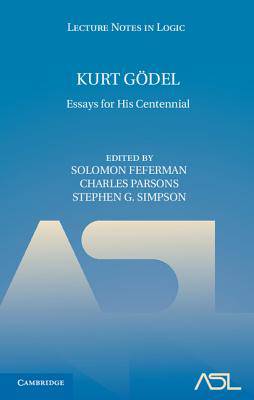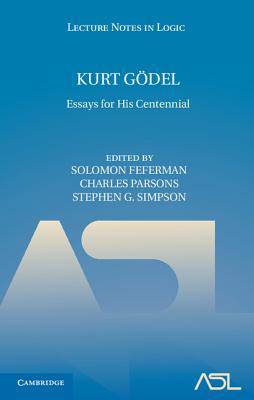
Door een staking bij bpost kan je online bestelling op dit moment iets langer onderweg zijn dan voorzien. Dringend iets nodig? Onze winkels ontvangen jou met open armen!
- Afhalen na 1 uur in een winkel met voorraad
- Gratis thuislevering in België vanaf € 30
- Ruim aanbod met 7 miljoen producten
Door een staking bij bpost kan je online bestelling op dit moment iets langer onderweg zijn dan voorzien. Dringend iets nodig? Onze winkels ontvangen jou met open armen!
- Afhalen na 1 uur in een winkel met voorraad
- Gratis thuislevering in België vanaf € 30
- Ruim aanbod met 7 miljoen producten
Zoeken
Omschrijving
Kurt Gödel (1906-1978) did groundbreaking work that transformed logic and other important aspects of our understanding of mathematics, especially his proof of the incompleteness of formalized arithmetic. This book on different aspects of his work and on subjects in which his ideas have contemporary resonance includes papers from a May 2006 symposium celebrating Gödel's centennial as well as papers from a 2004 symposium. Proof theory, set theory, philosophy of mathematics, and the editing of Gödel's writings are among the topics covered. Several chapters discuss his intellectual development and his relation to predecessors and contemporaries such as Hilbert, Carnap, and Herbrand. Others consider his views on justification in set theory in light of more recent work and contemporary echoes of his incompleteness theorems and the concept of constructible set.
Specificaties
Betrokkenen
- Auteur(s):
- Uitgeverij:
Inhoud
- Aantal bladzijden:
- 384
- Taal:
- Engels
- Reeks:
- Reeksnummer:
- nr. 33
Eigenschappen
- Productcode (EAN):
- 9780521115148
- Verschijningsdatum:
- 19/04/2010
- Uitvoering:
- Hardcover
- Formaat:
- Ongenaaid / garenloos gebonden
- Afmetingen:
- 155 mm x 231 mm
- Gewicht:
- 566 g

Alleen bij Standaard Boekhandel
+ 337 punten op je klantenkaart van Standaard Boekhandel
Beoordelingen
We publiceren alleen reviews die voldoen aan de voorwaarden voor reviews. Bekijk onze voorwaarden voor reviews.











